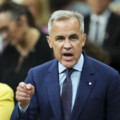A lot has already been discussed regarding the Centre for Substance Use and Addiction’s (CCSA) report that recommends drastic changes to health guidelines for alcohol.The CCSA’s new guidelines state that no amount of alcohol is safe. They recommend no more than two drinks a week for both men and women. Experts from the International Scientific Forum on Alcohol Research (ISFAR) called it “a pseudo-scientific amalgamation of selected studies of low scientific validity that fit their preconceived notions,” and more recently 16 prominent Quebec-based harm reduction experts, professors, and researchers have stated that the CCSA’s report misleads consumers with statements like “even in small doses, alcohol has consequences for everyone.”
But beyond the criticism the CCSA has received from those who work in the field of alcohol research, there is a once-murky link between the researchers who regularly push for neo-temperance policy change and international temperance organizations like Movendi.
Movendi is an international temperance group that preaches a zero-consumption approach to alcohol. Movendi was founded in the 1800s under the name “The Order of Good Templars,” but rebranded itself in 2020, possibly because their previous name sounded like it was from a Dan Brown novel.
Funny enough, Movendi funds its neo-temperance lobbying around the world by running a lottery in Sweden. Now, there is nothing morally wrong with running a lottery, or gambling for that matter, but running a lottery that has been sued by Sweden’s Consumer Agency for using misleading marketing tactics and defrauding consumers is certainly suspect and worthy of criticism. Not to mention the fact that they fund their puritanical war on one “sin” with the profits of another.
Movendi is important in the conversation about alcohol policy internationally, because they officially partner with the World Health Organization, but also domestically, because their affiliate researchers are the actual authors of the CCSA report that has faced so much criticism.
Yes, the authors of the CCSA’s report on alcohol, which was funded by your tax dollars via Health Canada, are openly affiliated with an international anti-alcohol organization whose main goal is creating an alcohol-free future.
How do we know this? Well, the authors of the CCSA report, Tim Stockwell, Timothy Naimi, and Adam Sherk, have open ties to Movendi that are clear for anyone to see. For example, just two days after the CCSA report was published, an interactive summary of the report was published on Movendi’s website, authored by the same set of authors.
In fact, these CSSA researchers cite on their own conflict of interest page that they are affiliated with Movendi International. And while their disclosure states that they are volunteer members with Movendi, according to the disclosures, they have travelled on Movendi’s dime to Movendi events in Sweden, and are featured on the Movendi podcast, dedicated to raising awareness about the dangers of alcohol.
And just how strident are these anti-alcohol lobbyists and the organization they are tied to? Well, again according to Movendi’s own website, their members take a pledge stating that they “are required to lead a life free from the use of alcohol and other intoxicating drugs”.
Now, there is nothing wrong with choosing to abstain from alcohol and other intoxicating drugs. To each their own. But taking one’s personal view and masquerading it as scientific, at taxpayers’ expense, and in turn lobbying the federal government for policy change, is another thing. Did taxpayers ask for their money to be used to fund anti-alcohol lobbying? Certainly not.

Imagine if the Government of Canada commissioned a study on the appropriate level of meat consumption, and it was discovered that the authors of the study, after coming to what is obviously a pre-drawn conclusion, are strident vegans affiliated with anti-meat organizations like People for Ethical Treatment of Animals (PETA)? Outrage would understandably follow, and the findings would be cast off as nothing more than ideologically driven pseudoscience.
Well, the good news for Canadians who drink is that despite the headlines about the CCSA’s report, it would appear the federal government is approaching the report and the CCSA’s fuzzy accounting with caution. As of right now, Canada’s low-risk guidelines remain at two drinks per day for women, and three drinks for men per day—as they should be, given the very small changes in absolute health risk that exist at this level of consumption.
At the end of the day, these anti-alcohol activists are just people who want to tax, forbid, and regulate as much of your lives as they can. They are nothing more than the Fun Police.
Recommended for You

‘There are consequences to this legislation’: Michael Geist on why the Canada-U.S. digital services tax dustup was a long time coming

The Weekly Wrap: The Liberals must abandon their internet regulation agenda

Colin Craig: A roadmap to more choice in health care

‘We need a plan for the future of a vibrant economy’: Interac’s Debbie Gamble on the interplay between public policy and private sector innovation



